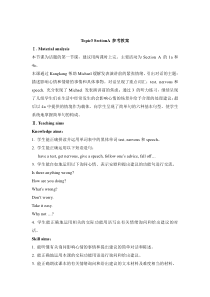 DOC
DOC
【文档说明】Unit 5 Topic 3《Many things can affect our feelings》(SectionA》word教案-八年级下册英语【仁爱版】.doc,共(5)页,27.500 KB,由小喜鸽上传
转载请保留链接:https://www.ichengzhen.cn/view-104388.html
以下为本文档部分文字说明:
Topic3SectionA参考教案Ⅰ.Materialanalysis本节课为话题的第一节课,建议用两课时上完。主要活动为SectionA的1a和4a。本课通过Kangkang帮助Michael缓解发表演讲前的紧张情绪,引出对
话的主题:描述影响心情和情绪的事情和具体事物。对话呈现了重点词汇:test,nervous和speech,充分表现了Michael发表演讲前的焦虑;通过3的听力练习,继续呈现了几组学生们在生活中经常发生的会影响心情的场景并给予合理的处理建议;最后以4a中提供的
情境作为载体,向学生呈现了简单句的六种基本句型,使学生系统地掌握简单句的构成。Ⅱ.TeachingaimsKnowledgeaims:1.学生能正确拼读并运用单词表中的黑体单词test,nervous和speech。2.学生能正确运用以下短语造句:haveatest,getnervous
,giveaspeech,followone’sadvice,falloff…3.学生能自如地运用以下询问心情、表示安慰和提出建议的功能句进行交流。Isthereanythingwrong?Howareyoudoing?What’swrong?Don’tworry.Takeit
easy.Whynot…?4.学生能正确地运用相关的交际功能用语写出有关情绪询问和给出建议的对话。Skillaims:1.能听懂有关询问影响心情的事情和提出建议的简单对话和陈述。2.能正确地运用本课的交际功能用语进行询问和给出建议。3.能正确朗读课本的有关情绪询问和给出
建议的文本材料及难度相当的材料。4.能正确地运用本课新呈现的短语,简单句和交际功能语言写出简单的有关情绪询问和给出建议的对话。Emotionalaims:1.通过对SectionA的学习,学生能够在英语学习中注意并
理解他人的情感,在别人心情不好时提出合理有效的建议,帮助伙伴远离消极情绪。2.学会勇于克服困难。Ⅲ.ThekeypointsanddifficultpointsKeypoints:1.学生在交流中能自如地运用描述情绪和情感的形
容词。2.辨别六种简单句式。Difficultpoints:系统地掌握简单句的构成。Ⅳ.Learningstrategies1.课前预习有助于新知识的理解和掌握。2.发表演讲之前要做好充分的准备。Ⅴ.Teachi
ngaidsComputermultimediaprojector.Ⅵ.TeachingproceduresIntroduction(8minutes)1.Greetthestudentsandmakethemreadyforlearnin
g.2.Theteachershowsdifferentfacialexpressions.Askstudentstoguessthewordsfordescribingthefeelings.3.Theteacherintroducesthenewwords:t
est,nervousandspeechbyshowingthepicturesonthescreen.Playthegame:Thebomb.(Thebomb:Theteacherdividesthe
studentsintotwogroups.Tellthestudentsthatoneofthenewwordsisthebomb.Whentheyreadaftertheteacher,theyarenotallowedtoreadthecertainword.Ifthegroupreadst
heword,theothergroupwillgetonepoint.)4.Theteachershowsthesixsentencesof4aonthescreenandasksthestudentstomarkthemwithS(sad),H(happy),
W(worried)orA(afraid).5.Theteacheraskstwostudentstotelltheanswers.Presentation(10minutes)1.Theteacherasksthestudentstoreadt
hequestionsin1b.(1)WhatisMichaelworriedabout?(2)HowdoesMichaelfeelwhenhehastogiveaspeech?(3)WhatisKangkang’ssuggestionforhelpingMichael?(4)Doy
outhinkMichaelwilldowellinhistest?2.Theteacherplaystheflashof1aforthefirsttimewithoutstopping.3.Teacherplays1aforthesecondtime,
stoppingwhennecessary.4.Thenasktwostudentstotelltheanswersto1b.5.Theteacherasksthestudentstoreadtheconversationandcompletethepassa
gein1c.6.Theteacheraskstwostudentstotelltheiranswers.Consolidation(10minutes)1.Theteacherplaystherecordingsen
tencebysentence.2.Theteacherplaystherecordingwithoutstopping.3.Letthestudentsread1a,Thenlearningroupstofindoutthediffic
ultpointsandsumupthemainpointsoftheconversation.4.Theteachermakesasummarytoexplainthekeypointsanddifficultpointstothestudents:(1)haveatest(2)getnerv
ous(3)giveaspeech5.Theteacherasksthe,studentstoread1aagainandprepareforactingouttheconversationinpairs.6.Theteacherasksseveralpairst
oactouttheconversation.7.Theteacherletsstudentsevaluatetheconversations.Thebestonescangettwopoints.Practice(10minutes)1.Theteacherintroducesthesixse
ntencestructurestothestudents,andthenasksthestudentstomatchthemwiththesentencesin4a.2.Theteacherletstwostudentstelltheiranswerstochecktheanswers.3.Th
eteacherasksthestudentstotellthesentencestructuresofthefollowingsentences:(1)Isthereanythingwrong?(2)I’mworried.(3)I’llhelpyou.(4)Thenyoucanpract
ice.(5)MissWanggavemeastorybookjustnow.(6)Mymotheralwaysasksmetoeatlessmeatandmorevegetables.4.Theteache
rasksthestudentstolistentotheconversationsandnumberthepicturesof3.5.Theteacheraskstwostudentstotelltheanswers.6.Theteacheraskst
hestudentstolistenagainandwritedownwhohassuchproblemsandcompletethesuggestionsforthem.7.Theteacheras
kstwostudentstowritedowntheanswersontheblackboard.Checktheanswers.8.Theteacherasksthestudentstopracticethebriefconversationsinpairs.Production(7
minutes)1.Theteacherorganizesthestudentstodiscussthefollowingquestionsingroups:(1)Howdoyoufeelwhenyougiveasp
eech?(2)Ifyourfriendisworriedabouthis/herspeech,howwillyouhelphim/hertorelax?2.Theteacherasksthestudentstomakeupconversationslike1aingroups
basedonthequestionsabove.Encouragethemtousemoreexpressions.3.Theteacherletsthestudentsshowtheirownproductionsbyactingoutthe
irconversations.4.Theteachersumsupthestudents’conversations.Thebestonescangettwopoints.Teachthemtogiveadvicetopeoplein
abadmood.5.Theteachershowsthesummarytothestudents.6.Theteacherassignshomework:(1)Reviewthesummaryafterclass.(
2)Askstudentstowriteapassageaccordingtotheconversationin1aandreadittothewholeclasstomorrow.(3)Prepare
SectionBafterclass.TeachingReflectionIt’salittlehardforthestudentstounderstandthesentencestructureswell.It’snecessaryfortheteachertodesig
nmoreexercisesforconsolidation.Andtheteachershouldletthestudentsknowthateveryoneneedshelpwhenheisinabadmood,soweshouldgiveothersahandwhenthe
yfeelsunhappy.Ⅶ.BlackboarddesignUnit5FeelingExcitedTopic3Manythingscanaffectourfeelings.SectionA1.haveatestG1G2G3G42.getnerv
ous113.giveaspeech224.followone’sadvice225.falloff…
 辽公网安备 21102102000191号
辽公网安备 21102102000191号
 营业执照
营业执照